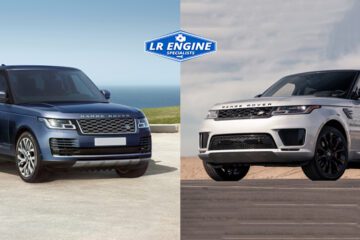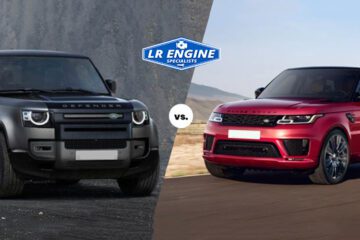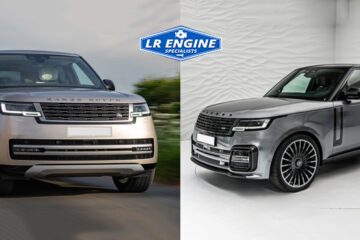Introduction:
When it comes to navigating the toughest terrains like mud and hills, selecting the right engine for your off-road adventures is necessary. Range Rover Velar Engine vs Range Rover Evoque Engine off-road performance is a common topic of discussion among enthusiasts and potential buyers. Both of these Range Rover versions come equipped with the latest technologies and modern engineering, but there are main differences in their off-road capabilities, particularly when it comes to their petrol and diesel engine models.
The Range Rover Velar and Range Rover Evoque are both products of Land Rover’s engineering expertise, designed to tackle rugged conditions while offering luxury and comfort. However, as off-road performance is a critical consideration for many drivers, it’s essential to understand how their engines compare, specifically for those who plan to take their vehicles through the toughest terrain, such as muddy paths and steep hills.
Explore the engine specifications of both the Velar and Evoque models, focusing on the petrol and diesel versions. Also, assess their off-road performance to make an informed decision on which one is better suited for navigating muddy trails and hilly landscapes.
Introduction to the Range Rover Velar and Evoque
It’s crucial to understand the distinction between the Range Rover Velar and Range Rover Evoque before delving into the engine specifications. Both models are built to offer the perfect fusion of style, comfort, and performance, but they are designed according to slightly different driving preferences.
>> The Range Rover Velar is a mid-size luxury SUV that sits between the Range Rover Sport and Range Rover Evoque in the brand’s range. It offers a more spacious interior, advanced design, and the latest technology features. The Velar is well-known for its elegant styling and advanced performance, both on and off the road.
>> The Range Rover Evoque, meanwhile, is a small luxury SUV that is more nimble and agile. It’s built for drivers who prefer a smaller, more workable vehicle but still want to experience the eminent Land Rover off-road capability. The Evoque has always been known for its classic design, city-friendly size, and ability to tackle rugged terrains.
While both vehicles share similar Land Rover heritage and are equipped with advanced technologies, their off-road engines are where the differences become more apparent.
Key Factors Affecting Off-Road Performance: Engine Power and Torque
When comparing the Range Rover Velar Engine vs Range Rover Evoque Engine off-road performance, engine power and torque are the fundamental elements to consider. Power decides how fast and efficiently the engine can propel the vehicle, while torque is the force that the engine can apply to move the vehicle over obstacles, like mud and hills.
In off-road conditions, torque plays a more remarkable role, specifically when navigating steep inclines or loose surfaces such as mud and gravel. A high-torque engine can provide the essential force to keep the wheels moving and prevent them from getting stuck. Therefore, understanding how both the Velar and Evoque engines deliver torque is vital for assessing their off-road capabilities.
Petrol Engine Performance: Range Rover Velar vs Evoque
The petrol engine variants of both the Range Rover Velar and Range Rover Evoque offer impressive performance, but there are differences in their outputs that influence their ability to perform off-road.
Range Rover Velar Petrol Engine:
The Range Rover Velar offers a range of petrol engine alternatives, including the 2.0-liter four-cylinder engine and the more potent 3.0-liter V6 engine. The 4-cylinder petrol engine generates around 250 horsepower, which is sufficient for most off-road situations. However, when handling steep hills or more challenging, muddy landscapes, the 3.0-liter V6 is the better choice. It produces 335 horsepower, with an incredible 480 Nm of torque, making it an exemplary choice for tackling difficult off-road trails.
The higher torque delivered by the V6 engine guarantees that the Velar maintains power through tough obstacles such as deep mud or sand. This extra torque means that the vehicle is less likely to get bogged down, even in the toughest conditions. The dynamic response of the Velar’s petrol engine ensures effortless acceleration, which is necessary when navigating challenging off-road paths.
Range Rover Evoque Petrol Engine:
On the other hand, the Range Rover Evoque offers petrol engines like the 2.0-liter four-cylinder engine, which delivers approximately 200 horsepower. While this engine is surely capable of everyday driving and light off-roading, it lacks the high torque of the Velar’s larger engines, meaning it can struggle through tough terrain, such as steep hills and deep mud.
The Evoque’s compact petrol engine is built more for city driving and mild off-road excursions. While it has the brand’s signature Terrain Response system, which helps adjust the vehicle’s settings for different surfaces, it may not be as effective in the toughest off-road conditions compared to the Velar’s higher-powered engine versions.
Diesel Engine Performance: Range Rover Velar vs Evoque
For those who prioritize the efficiency and power delivery of a diesel engine, both the Velar and Evoque offer diesel variants that are more appropriate for heavy-duty off-roading.
Range Rover Velar Diesel Engine:
The Velar’s diesel engine options include the 2.0-liter four-cylinder engine and the more powerful 3.0-liter V6 engine. The 2.0-liter diesel engine generates around 180 horsepower and 430 Nm of torque, which is enough for moderate off-roading tasks. However, when it comes to the toughest terrains, the 3.0-liter V6 diesel engine is a much better choice. It provides 300 horsepower and 700 Nm of torque, delivering ample power to tackle the harshest conditions, including muddy slopes and rocky paths.
The 3.0-liter V6 diesel engine in the Velar offers incredible low-end torque, which is vital when tackling obstacles such as hills or mud. This engine enables the Velar to maintain traction, even in slippery conditions, guaranteeing that the vehicle can ascend or descend inclines without losing momentum.
Range Rover Evoque Diesel Engine:
The Range Rover Evoque’s diesel engine variants also have the 2.0-liter four-cylinder engine, which produces approximately 180 horsepower and 430 Nm of torque, similar to the Velar’s entry-level diesel option. However, the Evoque is lighter and smaller than the Velar, which gives it an edge when navigating tight off-road trails or muddy patches. While it doesn’t have the sufficient torque of the Velar’s V6 diesel engine, the Evoque’s smaller diesel engine delivers enough power for most off-road scenarios, specifically when coupled with the brand’s Terrain Response system.
The Evoque’s diesel engine is a desirable choice for drivers who want a capable off-roader without the need for extreme power. It’s particularly appropriate for those who primarily drive on lightly rugged trails and uneven terrains.
Verdict: Which Engine is Better for Mud and Hills?
In the Range Rover Velar Engine vs Range Rover Evoque Engine off-road performance contest, it’s clear that both versions offer commendable off-road capabilities, but with some clear differences.
>> If you’re planning to take your vehicle on the toughest terrains, such as deep mud and steep hills, the Range Rover Velar with the 3.0-liter V6 petrol or diesel engines is a better option. Its higher power and torque output provide superior traction, allowing it to tackle even the most demanding conditions with ease.
>> The Range Rover Evoque, while still capable of handling moderate off-road situations, is better suited for those who demand a more compact SUV for city driving, with the occasional off-road excursion. The Evoque’s smaller petrol and diesel engines make it a lighter vehicle, which is beneficial for navigating tight trails but less effective in more extreme conditions.
Conclusion:
If you emphasize off-road performance in muddy conditions and on hilly terrains, the Range Rover Velar Engine, especially the 3.0-liter V6 engine variants, will provide excellent power and torque for those demanding adventures. However, if you’re looking for a vehicle for less extreme off-roading with a more agile, compact frame, the Range Rover Evoque Engine offers strong performance, specifically in lighter conditions.
Look no further than LR Engine Specialists for expert advice and high-quality engine maintenance for your Range Rover. Our team is committed to providing meticulous care and service for Range Rover engines, guaranteeing your vehicle performs exemplary both on and off the road.
FAQs:
Which engine is better for mud and hills – Velar or Evoque?
The Velar’s 3.0-liter V6 petrol or diesel engine offers excellent torque and power for tough terrains such as mud and hills.
Is the Evoque good for off-roading?
Yes, the Evoque tackles moderate off-road conditions well, particularly with Terrain Response, but lacks the power for extreme trails.
Does torque matter more than horsepower for off-roading?
Yes, torque is vital for off-roading as it helps move the vehicle through mud and up steep hills effectively.
Which engine is more fuel-efficient off-road, diesel or petrol?
Diesel engines generally offer better fuel efficiency and torque at lower RPMs, perfect for off-road conditions.
Can the Evoque manage steep hills?
The Evoque can manage moderate inclines, but it may struggle with very steep or muddy hills compared to the Velar V6.


